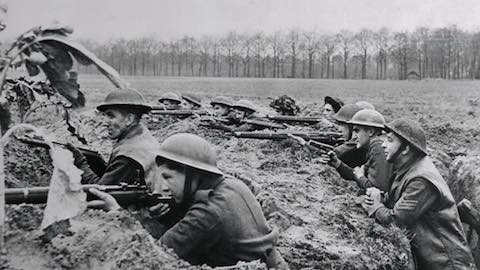- MENU
- HOME
- SEARCH
- WORLD
- MAIN
- AFRICA
- ASIA
- BALKANS
- EUROPE
- LATIN AMERICA
- MIDDLE EAST
- United Kingdom
- United States
- Argentina
- Australia
- Austria
- Benelux
- Brazil
- Canada
- China
- France
- Germany
- Greece
- Hungary
- India
- Indonesia
- Ireland
- Israel
- Italy
- Japan
- Korea
- Mexico
- New Zealand
- Pakistan
- Philippines
- Poland
- Russia
- South Africa
- Spain
- Taiwan
- Turkey
- USA
- BUSINESS
- WEALTH
- STOCKS
- TECH
- HEALTH
- LIFESTYLE
- ENTERTAINMENT
- SPORTS
- RSS
- iHaveNet.com: World

How Aggression Went From an Act of War to a Pathology
by Russ Wellen
Viewing a state's aggression as pathology incurred punishment, not the understanding one might expect. (Photo: Bettman / Corbis)
Aggression by a state, once considered just an act of war, ultimately became viewed as a pathological act.
I've been re-reading Sir Lawrence Freedman's landmark work
The Evolution of Nuclear Strategy, Third Edition
for a book I'm attempting to write about the rationalizations and counterintuitive strategies that inevitably attend a state's development of nuclear weapons. (For his part, Freedman has written around 20 books.)
In the first part of The Evolution of Nuclear Strategy, Third Edition ,
Freedman chronicles the rise of air power during the 20th century. He writes that, in the nineteenth century, the concept of aggression referred to a "‘military attack by the forces of a state against … another state.'" But, even before World War I, "the term had become pejorative, referring to a military attack that was not justified by law."
Then, after World War II, "the distinction between peace-loving and aggressive states was" actually "adopted as a guide to the proper assignment of blame for the outbreak of war." In fact, aggression came to be seen as "the most deviant form of international behavior. … As it inevitably led to disaster, it could never be an act of men possessed of rationality and moral sensibilities, who would use peaceful means to settle disputes." [Emphasis added.]
Furthermore:
The adoption of violent means betrayed more than an aggressor's strategic calculus. It also betrayed something about the nature of his society. It was symptomatic of a particular culture, one that bred in profusion ‘authoritarian' or ‘aggressive' personalities.
War "was an irrational act and thus had an irrational cause. … Social scientists and psychologists, convinced of the essential irrationality of war, searched for its causes in the alienation of industrial man, patterns of child-rearing, the ambition of megalomaniacs, the dreams of political utopias, and the potency of unthinking nationalist, rather than such mundane things as geographical vulnerabilities, a sense of grievance, or straightforward conflicts of national interests." In other words, use of the term aggression, "confused a military judgment with a moral stance."
In consequence, aggressors could not be relied upon to listen to reason. What they might listen to was their own language -- that of force.
Ironically, that runs counter to the current trend of behaviors -- from addictions to aggression -- classified as illness in the DSM (the Diagnostic and Statistical Manual of Mental Disorders), thus paving the way for more humane forms of treatment (theoretically, anyway). Aggression, once classified as deviant behavior, only subjected states to unequivocal punishment (or the threat thereof).
Too bad psychopharmaceutical drugs couldn't be administered to a whole nation as a means of heading off incipient aggression at the pass (kidding!). Anyway, that became the operating principle with which the West then dealt with Russia.
Available at Amazon.com:
The Evolution of Nuclear Strategy, Third Edition
In Pursuit of Prosperity: U.S Foreign Policy in an Era of Natural Resource Scarcity
Capital in the Twenty-First Century
A World Restored: Metternich, Castlereagh and the Problems of Peace, 1812-22
World Order: Reflections on the Character of Nations and the Course of History
- The Weakening Foundations of Western Power
- The New Global Marketplace of Political Change
- Diplomacy in the Age of Globalization
- Why the World Is Becoming the Un-Sweden
- Venture Capitalists Rule the World
- Authoritarian Symps
- Celebrating Wars & Destruction
- The Decline of War?
- Transhumanism and War
- How Aggression Went From an Act of War to a Pathology
- Assessing the Nuclear Non-Proliferation Regime
- Healing or Harming? The Provision of Health Care by Peacekeepers
- Learning the Lessons of Ebola
- NGOs: Foreign Agents
- How Climate Change and Resource Scarcity Are Upending World Politics
- Humanity's War on Wildlife
- Women Up in Arms
- Nations and Borders are Always Messy
- Comparing Atrocities
- Religious Violence: What We Get Wrong
- Crying 'Lone Wolf'
- Partnering against Human Trafficking
- 8 Ways to Reduce Global Inequality
- Population Decline and the Great Economic Reversal
- The Intersection of Three Crises
- A New Global Development Bank in Town
- Henry Kissinger: 'Low-Life Scum'
- Reclaiming Privacy in the Golden Age of Surveillance
- Sony, the Internet of Things, and the Evolving Cyber-Threat
- Cyber Jihadists and Their Web
- Targeted Sanctions and the Right to Due Process
- The Dynamics of Global Change
- Is the Concept of Terrorism Still Useful?
- Muslim Cartoonist Draws Lessons from the Charlie Hebdo Massacre
- Refereeing a Race to the Bottom
- How Liberal Democracy Promotes Inequality
- The Dance of Superpowers
- The Big Chill: Tensions in the Arctic
- The Games of Our Lives
- Kissinger on World Order
- The War on Terrorism: The Way Forward
WORLD | AFRICA | ASIA | EUROPE | LATIN AMERICA | MIDDLE EAST | UNITED STATES
Article: Courtesy of Foreign Policy in Focus
"How Aggression Went From an Act of War to a Pathology"